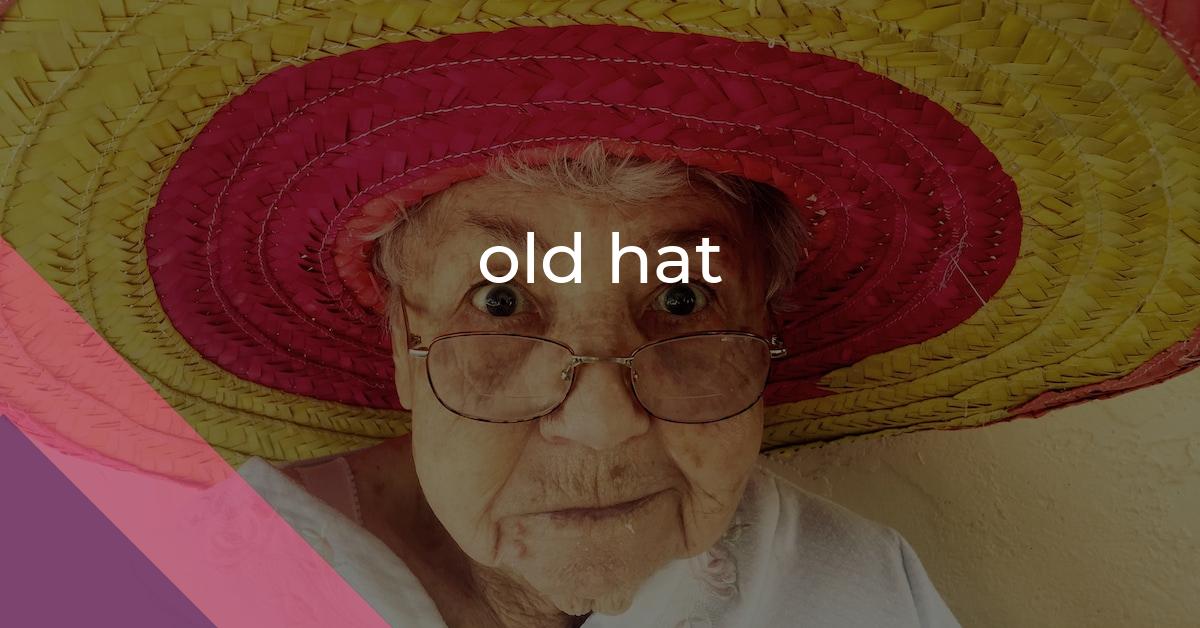old hat: Idiom Meaning and Origin
What does ‘old hat’ mean?
The idiom *old hat* means something that is old-fashioned, outdated, or no longer interesting or impressive. It refers to a hat that is no longer trendy or fashionable, suggesting that something has become clichéd or overused.

Idiom Explorer
The idiom "some old" refers to something that is considered outdated or not relevant anymore. It is often used to dismiss or downplay the importance or significance of something.
The idiom "same old story" means a situation or story that is repetitive, familiar, and uninteresting due to its lack of change or variation.
An idiom often used to describe a person who is disliked or considered bad, with negative qualities or behavior.
The idiom "ripe old age" means reaching an advanced and mature stage in life, often referring to someone who has lived a long and fulfilling life.
The idiom "put a hat on a hat" means to make a situation or an idea unnecessarily complicated or redundant by adding extra layers or elements.
The idiom "piece of shit" is an offensive expression used informally to describe something or someone as being of very poor quality or value.
The idiom "pick out of a hat" means to randomly choose or select something without any particular order or method.
The idiom "pass the hat" means to collect or contribute money for a particular purpose or cause, typically by individuals giving small amounts of money.
An idiom used to refer to a particular person's character, occupation, or role, highlighting its uniqueness and individuality.
The idiom "over the hill" refers to reaching a point in life where someone is considered old or past their prime, often used to describe someone who is no longer young or able to do things as well as they used to.
Decoding "Old Hat"
The idiom "old hat" is commonly used in English to describe something that is outdated or no longer fashionable. It is believed to have originated in the mid-19th century and has since become a popular phrase in everyday conversation.
One possible theory for the origin of this idiom is its connection to the world of theater. During the late 19th and early 20th centuries, actors would often wear hats as part of their costumes. As time went on, certain styles of hats would become outdated and fall out of fashion. These "old hats" would be worn by actors who portrayed characters from a different era, emphasizing their outdated nature. It's possible that this theatrical usage of the term eventually made its way into everyday language.
Another theory suggests that the idiom may have originated from the practice of tradespeople displaying their wares on their heads, with the "old hat" being a sign that their goods were no longer in demand. As new products and trends emerged, the older ones would become "old hat" and lose their popularity.
Regardless of its exact origin, the idiom "old hat" has come to represent anything that is considered to be outdated or out of style. It is often used to express a lack of interest or enthusiasm for something that has become commonplace or uninteresting. It can also be used humorously to emphasize the rapid pace of change in society and how quickly something can become outdated.
The idiom "old as the hills" is related to "old hat" in that it shares a similar concept of age and obsolescence. Both idioms are used to describe something that has been around for a long time and is no longer relevant or fashionable. While "old hat" specifically refers to something that was once popular but is now outdated, "old as the hills" emphasizes the age and timelessness of a particular thing or idea.
The phrase "old chestnut" is another idiom that shares a connection with "old hat." It is used to refer to a joke or story that is no longer funny or interesting because it has been told so many times. Similarly, "old hat" can be used to describe something that has become clichéd or overused, losing its original appeal. Both idioms convey a sense of weariness or boredom with something that was once considered novel or entertaining.
The idiom "old hand" also ties into the theme of "old hat." It refers to someone who is experienced or skilled in a particular area. Just as "old hat" implies that something is no longer fashionable or up-to-date, "old hand" suggests that someone has been around for a long time and has acquired expertise in their field. While "old hat" may have a negative connotation of being outdated, "old hand" carries a more positive meaning of wisdom and proficiency.
While the idiom "old hat" may seem straightforward in its meaning, it is important to consider the cultural context in which it is used. Different generations may have different interpretations of what constitutes "old hat," as fashion and trends evolve over time. Additionally, the phrase can be subjective, with one person's "old hat" being another person's cherished tradition or valuable item.
The idiom "old hat" is a reminder that society is constantly evolving, and what may be perceived as cutting-edge today could easily become outdated tomorrow. It serves as a cautionary tale to not become too attached to the status quo and to remain open to new ideas and innovations.
Example usage
Examples of how the idiom "old hat" can be used in a sentence:
- Wearing a suit to a casual party is so old hat. (meaning outdated or out of style)
- She has been working in the fashion industry for so long that designing a new collection is just old hat to her. (meaning something that is very familiar or routine)
- Using cash for transactions feels old hat in the age of digital payments. (meaning something that is no longer considered innovative or exciting)
The idiom "old hat" is often used to describe something that is outdated or no longer fashionable or interesting. It suggests that the thing in question has become so familiar or routine that it has lost its novelty or excitement. It can also imply that something is no longer considered innovative or cutting-edge. The idiom is typically used in a negative context to convey a sense of boredom or lack of novelty.
More "Outdated" idioms



